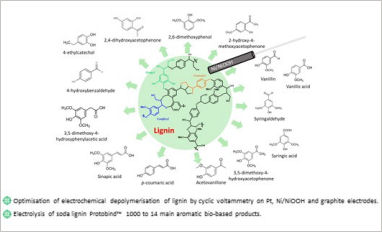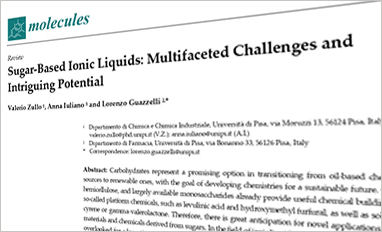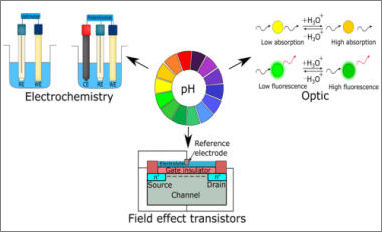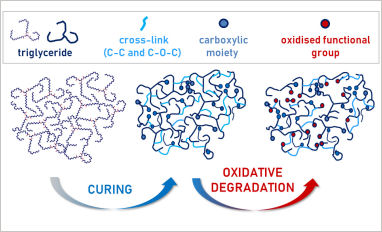
 Congratulations to our Ph.D. Nicola Di Fidio for his scientific publication "Electro-oxidative depolymerisation of technical lignin in water using platinum, nickel oxide hydroxide and graphite electrodes" on the RSC "New Journal of Chemistry". In order to improve the lignin exploitation to added-value bioproducts, a mild chemical conversion route based on electrochemistry was implemented.
Congratulations to our Ph.D. Nicola Di Fidio for his scientific publication "Electro-oxidative depolymerisation of technical lignin in water using platinum, nickel oxide hydroxide and graphite electrodes" on the RSC "New Journal of Chemistry". In order to improve the lignin exploitation to added-value bioproducts, a mild chemical conversion route based on electrochemistry was implemented.
 Carbohydrates represent a promising option in transitioning from oil-based chemical resources to renewable ones, with the goal of developing chemistries for a sustainable future. Cellulose, hemicellulose, and largely available monosaccharides already provide useful chemical building blocks, so-called platform chemicals, such as levulinic acid and hydroxymethyl furfural, as well as solvents like cyrene or gamma-valerolactone.
Carbohydrates represent a promising option in transitioning from oil-based chemical resources to renewable ones, with the goal of developing chemistries for a sustainable future. Cellulose, hemicellulose, and largely available monosaccharides already provide useful chemical building blocks, so-called platform chemicals, such as levulinic acid and hydroxymethyl furfural, as well as solvents like cyrene or gamma-valerolactone.
 Congratulations to our Ph.D. students Federico Vivaldi, Noemi Poma and Andrea Bonini, from the Chemistry Lab for Analytical Technologies and Sensors (CATS), for their recent review entitled "Recent advances in optical, electrochemical and field effect pH sensors". Although its first definition dates back to more than a century ago, pH and its measurement are still studied for improving the performance of current sensors in everyday analysis.
Congratulations to our Ph.D. students Federico Vivaldi, Noemi Poma and Andrea Bonini, from the Chemistry Lab for Analytical Technologies and Sensors (CATS), for their recent review entitled "Recent advances in optical, electrochemical and field effect pH sensors". Although its first definition dates back to more than a century ago, pH and its measurement are still studied for improving the performance of current sensors in everyday analysis.
 Congratulations to our Ph.D. student Silvia Pizzimenti for her publication "Oxidation and Cross-Linking in the Curing of Air-Drying Artists’ Oil Paints" on ACS Applied Polymer Materials. The objective of this study is to improve the molecular understating of the processes that lead to the conversion of the fluid binder into a dry film, and how this evolves with time, which is at the base of a better comprehension of degradation phenomena of oil paintings, and relevant to the artists' paint manufacturing industry.
Congratulations to our Ph.D. student Silvia Pizzimenti for her publication "Oxidation and Cross-Linking in the Curing of Air-Drying Artists’ Oil Paints" on ACS Applied Polymer Materials. The objective of this study is to improve the molecular understating of the processes that lead to the conversion of the fluid binder into a dry film, and how this evolves with time, which is at the base of a better comprehension of degradation phenomena of oil paintings, and relevant to the artists' paint manufacturing industry.



